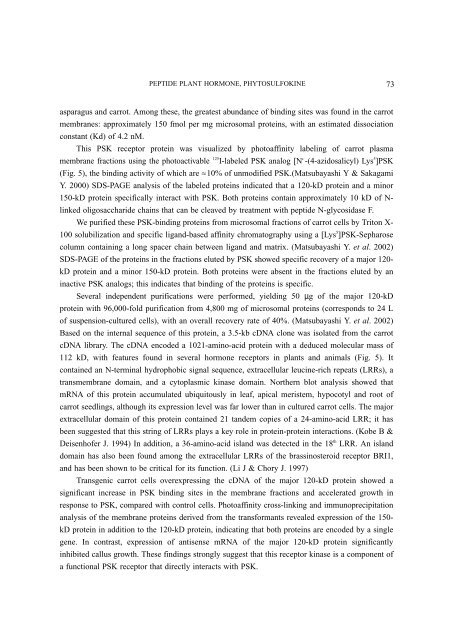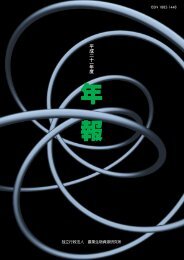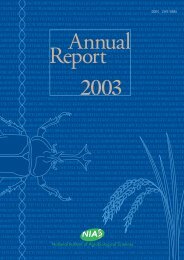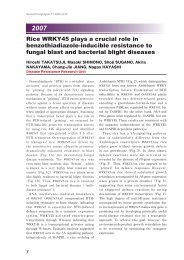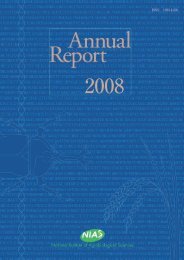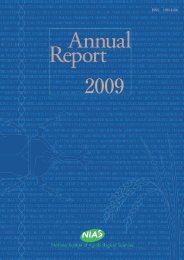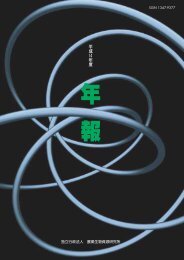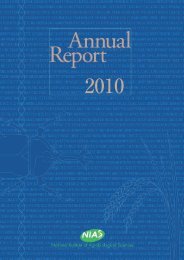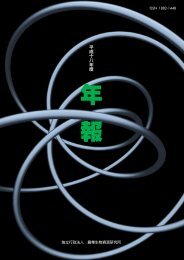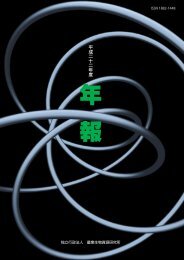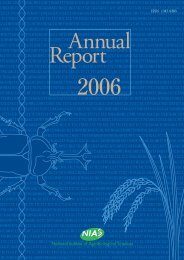No.42 - è¾²æ¥çç©è³æºç 究æ
No.42 - è¾²æ¥çç©è³æºç 究æ
No.42 - è¾²æ¥çç©è³æºç 究æ
You also want an ePaper? Increase the reach of your titles
YUMPU automatically turns print PDFs into web optimized ePapers that Google loves.
PEPTIDE PLANT HORMONE, PHYTOSULFOKINE<br />
73<br />
asparagus and carrot. Among these, the greatest abundance of binding sites was found in the carrot<br />
membranes: approximately 150 fmol per mg microsomal proteins, with an estimated dissociation<br />
constant (Kd) of 4.2 nM.<br />
This PSK receptor protein was visualized by photoaffinity labeling of carrot plasma<br />
membrane fractions using the photoactivable 125 I-labeled PSK analog [N -(4-azidosalicyl) Lys 5 ]PSK<br />
(Fig. 5), the binding activity of which are ≈ 10% of unmodified PSK.(Matsubayashi Y & Sakagami<br />
Y. 2000) SDS-PAGE analysis of the labeled proteins indicated that a 120-kD protein and a minor<br />
150-kD protein specifically interact with PSK. Both proteins contain approximately 10 kD of N-<br />
linked oligosaccharide chains that can be cleaved by treatment with peptide N-glycosidase F.<br />
We purified these PSK-binding proteins from microsomal fractions of carrot cells by Triton X-<br />
100 solubilization and specific ligand-based affinity chromatography using a [Lys 5 ]PSK-Sepharose<br />
column containing a long spacer chain between ligand and matrix. (Matsubayashi Y. et al. 2002)<br />
SDS-PAGE of the proteins in the fractions eluted by PSK showed specific recovery of a major 120-<br />
kD protein and a minor 150-kD protein. Both proteins were absent in the fractions eluted by an<br />
inactive PSK analogs; this indicates that binding of the proteins is specific.<br />
Several independent purifications were performed, yielding 50 µg of the major 120-kD<br />
protein with 96,000-fold purification from 4,800 mg of microsomal proteins (corresponds to 24 L<br />
of suspension-cultured cells), with an overall recovery rate of 40%. (Matsubayashi Y. et al. 2002)<br />
Based on the internal sequence of this protein, a 3.5-kb cDNA clone was isolated from the carrot<br />
cDNA library. The cDNA encoded a 1021-amino-acid protein with a deduced molecular mass of<br />
112 kD, with features found in several hormone receptors in plants and animals (Fig. 5). It<br />
contained an N-terminal hydrophobic signal sequence, extracellular leucine-rich repeats (LRRs), a<br />
transmembrane domain, and a cytoplasmic kinase domain. Northern blot analysis showed that<br />
mRNA of this protein accumulated ubiquitously in leaf, apical meristem, hypocotyl and root of<br />
carrot seedlings, although its expression level was far lower than in cultured carrot cells. The major<br />
extracellular domain of this protein contained 21 tandem copies of a 24-amino-acid LRR; it has<br />
been suggested that this string of LRRs plays a key role in protein-protein interactions. (Kobe B &<br />
Deisenhofer J. 1994) In addition, a 36-amino-acid island was detected in the 18 th LRR. An island<br />
domain has also been found among the extracellular LRRs of the brassinosteroid receptor BRI1,<br />
and has been shown to be critical for its function. (Li J & Chory J. 1997)<br />
Transgenic carrot cells overexpressing the cDNA of the major 120-kD protein showed a<br />
significant increase in PSK binding sites in the membrane fractions and accelerated growth in<br />
response to PSK, compared with control cells. Photoaffinity cross-linking and immunoprecipitation<br />
analysis of the membrane proteins derived from the transformants revealed expression of the 150-<br />
kD protein in addition to the 120-kD protein, indicating that both proteins are encoded by a single<br />
gene. In contrast, expression of antisense mRNA of the major 120-kD protein significantly<br />
inhibited callus growth. These findings strongly suggest that this receptor kinase is a component of<br />
a functional PSK receptor that directly interacts with PSK.


